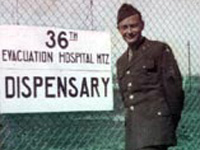Film Calendar
Thursday, November 3, 2005:
The Good War and Those Who Refused to
Fight It
Thursday, January 12, 2006:
Weapons of the Spirit
Thursday, March 9, 2006
A
Force More Powerful
| Weapons
of the
Spirit
Le Chambon-sur-Lignon was a tiny Protestant farming village in the mountains of south-central France. Defying the Nazis and the French government that was collaborating with the Nazis, the villagers of the area of Le Chambon provided a safe haven throughout the war for whoever knocked on their door. Most of the villagers were proud descendants of the Huguenots, the first Protestants in Catholic France. They remembered their own history of persecution, and it mattered to them. They also read the Bible, and tried to heed the admonition to love your neighbor as yourself. "The responsibility of Christians," their pastor, André Trocmé, had reminded them the day after France surrendered to Nazi Germany, "is to resist the violence that will be brought to bear on their consciences through the weapons of the spirit." There were many other uncelebrated individual and collective acts of goodwill and righteousness throughout the dark war years. But nowhere else did a persistent and successful moral consensus develop on a scale approaching what happened in the area of Le Chambon. (description from Amazon.com)
|

|
|
Segment
Descriptions INDIA-DEFYING
THE CROWN Mohandas
Gandhi's famous Salt March of 1930 - during which he inspires Indians to
protest the British salt monopoly - is a turning point in the movement for
Indian independence. SOUTH
AFRICA - FREEDOM IN OUR LIFETIME
Young activist Mkhuseli Jack leads a consumer boycott campaign against
apartheid in the black townships of the Eastern Cape Province of South
Africa. DENMARK
- LIVING WITH THE ENEMY
During five years of Nazi occupation, Danes' noncooperation undermines the
Germans' attempt to exploit POLAND-"WE'VE
CAUGHT GOD BY THE ARM"
The 1980 Gdansk Shipyard strike wins Poles the right to have free trade
unions, launches the Solidarity movement, and catapults him to national
labor leader and eventually president of Poland. . CHILE-DEFEAT OF A DICTATOR Overcoming a decade of paralyzing fear, Chilean copper miners trigger a national day of protest of the dictatorship of Gen. Augusto Pinochet, leading to years of nonviolent organizing and culminating in victory in a plebiscite to end his rule.
|


